An old man bending I come among new faces,
Years looking backward resuming in answer to children,
Come tell us old man, as from young men and maidens that love me,
(Arous'd and angry, I'd thought to beat the alarum, and urge relentless war,
But soon my fingers fail'd me, my face droop'd and I resign'd myself,
To sit by the wounded and soothe them, or silently watch the dead;)
Years hence of these scenes, of these furious passions, these chances,
Of unsurpass'd heroes, (was one side so brave? the other was equally brave;)
Now be witness again, paint the mightiest armies of earth,
Of those armies so rapid so wondrous what saw you to tell us?
What stays with you latest and deepest? of curious panics,
Of hard-fought engagements or sieges tremendous what deepest remains?
O maidens and young men I love and that love me,
What you ask of my days those the strangest and sudden your talking recalls,
Soldier alert I arrive after a long march cover'd with sweat and dust,
In the nick of time I come, plunge in the fight, loudly shout in the rush of successful charge,
Enter the captur'd works—yet lo, like a swift-running river they fade,
Pass and are gone they fade—I dwell not on soldiers' perils or soldiers' joys,
(Both I remember well—many the hardships, few the joys, yet I was content.)
But in silence, in dreams' projections,
While the world of gain and appearance and mirth goes on,
So soon what is over forgotten, and waves wash the imprints off the sand,
With hinged knees returning I enter the doors, (while for you up there,
Whoever you are, follow without noise and be of strong heart.)
Bearing the bandages, water and sponge,
Straight and swift to my wounded I go,
Where they lie on the ground after the battle brought in,
Where their priceless blood reddens the grass the ground,
Or to the rows of the hospital tent, or under the roof'd hospital,
To the long rows of cots up and down each side I return,
To each and all one after another I draw near, not one do I miss,
An attendant follows holding a tray, he carries a refuse pail,
Soon to be fill'd with clotted rags and blood, emptied, and fill'd again.
I onward go, I stop,
With hinged knees and steady hand to dress wounds,
I am firm with each, the pangs are sharp yet unavoidable,
One turns to me his appealing eyes—poor boy! I never knew you,
Yet I think I could not refuse this moment to die for you, if that would save you.
On, on I go, (open doors of time! open hospital doors!)
The crush'd head I dress, (poor crazed hand tear not the bandage away,)
The neck of the cavalry-man with the bullet through and through examine,
Hard the breathing rattles, quite glazed already the eye, yet life struggles hard,
(Come sweet death! be persuaded O beautiful death! In mercy come quickly.)
From the stump of the arm, the amputated hand,
I undo the clotted lint, remove the slough, wash off the matter and blood,
Back on his pillow the soldier bends with curv'd neck and side falling head,
His eyes are closed, his face is pale, he dares not look on the bloody stump,
And has not yet look'd on it.
I dress a wound in the side, deep, deep,
But a day or two more, for see the frame all wasted and sinking,
And the yellow-blue countenance see.
I dress the perforated shoulder, the foot with the bullet-wound,
Cleanse the one with a gnawing and putrid gangrene, so sickening, so offensive,
While the attendant stands behind aside me holding the tray and pail.
I am faithful, I do not give out,
The fractur'd thigh, the knee, the wound in the abdomen,
These and more I dress with impassive hand, (yet deep in my breast a fire, a burning flame.)
Thus in silence in dreams' projections,
Returning, resuming, I thread my way through the hospitals,
The hurt and wounded I pacify with soothing hand,
I sit by the restless all the dark night, some are so young,
Some suffer so much, I recall the experience sweet and sad,
(Many a soldier's loving arms about this neck have cross'd and rested,
Many a soldier's kiss dwells on these bearded lips.)
Years looking backward resuming in answer to children,
Come tell us old man, as from young men and maidens that love me,
(Arous'd and angry, I'd thought to beat the alarum, and urge relentless war,
But soon my fingers fail'd me, my face droop'd and I resign'd myself,
To sit by the wounded and soothe them, or silently watch the dead;)
Years hence of these scenes, of these furious passions, these chances,
Of unsurpass'd heroes, (was one side so brave? the other was equally brave;)
Now be witness again, paint the mightiest armies of earth,
Of those armies so rapid so wondrous what saw you to tell us?
What stays with you latest and deepest? of curious panics,
Of hard-fought engagements or sieges tremendous what deepest remains?
O maidens and young men I love and that love me,
What you ask of my days those the strangest and sudden your talking recalls,
Soldier alert I arrive after a long march cover'd with sweat and dust,
In the nick of time I come, plunge in the fight, loudly shout in the rush of successful charge,
Enter the captur'd works—yet lo, like a swift-running river they fade,
Pass and are gone they fade—I dwell not on soldiers' perils or soldiers' joys,
(Both I remember well—many the hardships, few the joys, yet I was content.)
But in silence, in dreams' projections,
While the world of gain and appearance and mirth goes on,
So soon what is over forgotten, and waves wash the imprints off the sand,
With hinged knees returning I enter the doors, (while for you up there,
Whoever you are, follow without noise and be of strong heart.)
Bearing the bandages, water and sponge,
Straight and swift to my wounded I go,
Where they lie on the ground after the battle brought in,
Where their priceless blood reddens the grass the ground,
Or to the rows of the hospital tent, or under the roof'd hospital,
To the long rows of cots up and down each side I return,
To each and all one after another I draw near, not one do I miss,
An attendant follows holding a tray, he carries a refuse pail,
Soon to be fill'd with clotted rags and blood, emptied, and fill'd again.
I onward go, I stop,
With hinged knees and steady hand to dress wounds,
I am firm with each, the pangs are sharp yet unavoidable,
One turns to me his appealing eyes—poor boy! I never knew you,
Yet I think I could not refuse this moment to die for you, if that would save you.
On, on I go, (open doors of time! open hospital doors!)
The crush'd head I dress, (poor crazed hand tear not the bandage away,)
The neck of the cavalry-man with the bullet through and through examine,
Hard the breathing rattles, quite glazed already the eye, yet life struggles hard,
(Come sweet death! be persuaded O beautiful death! In mercy come quickly.)
From the stump of the arm, the amputated hand,
I undo the clotted lint, remove the slough, wash off the matter and blood,
Back on his pillow the soldier bends with curv'd neck and side falling head,
His eyes are closed, his face is pale, he dares not look on the bloody stump,
And has not yet look'd on it.
I dress a wound in the side, deep, deep,
But a day or two more, for see the frame all wasted and sinking,
And the yellow-blue countenance see.
I dress the perforated shoulder, the foot with the bullet-wound,
Cleanse the one with a gnawing and putrid gangrene, so sickening, so offensive,
While the attendant stands behind aside me holding the tray and pail.
I am faithful, I do not give out,
The fractur'd thigh, the knee, the wound in the abdomen,
These and more I dress with impassive hand, (yet deep in my breast a fire, a burning flame.)
Thus in silence in dreams' projections,
Returning, resuming, I thread my way through the hospitals,
The hurt and wounded I pacify with soothing hand,
I sit by the restless all the dark night, some are so young,
Some suffer so much, I recall the experience sweet and sad,
(Many a soldier's loving arms about this neck have cross'd and rested,
Many a soldier's kiss dwells on these bearded lips.)
inviata da Bernart Bartleby - 12/6/2014 - 12:06
Lingua: Italiano
Traduzione italiana di Enzo Giachino da “Foglie d’erba”, Einaudi, Torino, 1993.
Trovata su Anarconurse – Nursing in Movimento

Trovata su Anarconurse – Nursing in Movimento

L’INFERMIERE DEI FERITI
Vecchio e cadente, avanzo tra volti nuovi.
Risalgo il corso degli anni e ricordo per rispondere ai bimbi,
Vieni, raccontaci, vecchio, da parte di fanciulli, di fanciulli che amano,
(Irato, furioso avevo pensato di suonare l’allarme. di spingerli ad una guerra senza tregua.
Ma presto mi caddero le mani, curvai il voto e mi rassegnai.
Sedere presso i feriti ed alleviarne le pene, o In silenzio vegliare i morti;)
Tanti anni dopo queste scene, queste furiose passioni, queste occasioni,
Di eroi da nessuno mai superati, (si fu valorosi da una parte? dall’altra si fu valorosi ugualmente.)
Oggi testimonia di nuovo, descrivi le più possenti armate della terra.
Di quelle armate cosi rapide, cosi prodigiose. che hai mal veduto da poterci narrare?
Che ti è rimasto, estremo e più profondo? strani sgomenti,
Scontri accaniti, assedi terribili, che ti è rimasto più nel profondo?
Fanciulle, fanciulli che amo e che mi amate,
Ciò che voi mi chiedete dei miei giorni, i più strani e improvvisi che evocano le vostre parole.
Soldato vigile arrivo dopo una lunga marcia, coperto d sudore e polvere.
Arrivo in buon punto, mi tuffo nella mischia, ad alta voce urto nell’impeto della carica vittoriosa
Entro nella fortezza espugnata - ma osservate, come un rapido fiume svaniscono
Passano e sono scomparsi, svaniscono – io non mi attardo sui pericoli dei soldati,
(Gli uni e le altre ben li ricordo – molti i travagli, scarse le gioie, e tuttavia ne ero contento.)
Ma in silenzio, in visioni di sogno,
Mentre il mondo dei guadagni, delle apparenze, dell’allegria va per la sua strada.
Presto odiato ciò che oramai e trascorso, e intanto le onde cancellano le importe sulla sabbia.
Con snodate ginocchia tornando penetro nelle porte (allora tu, lassù.
Chiunque tu sia, seguimi senza rumore e sta saldo d cuore.)
Recando bende, l’acqua e la spugna.
Rapido mi dirigo verso i miei feriti,
Dove giacciono per terra, ivi portati dopo la battaglia.
Dove il loro sangue prezioso arrossa l’erba per terra,
O verso le file di giacigli nella tenda dell’ambulanza, o sotto il tetto d un ospedale.
Percorso le lunghe distese di brande da una parte e dall’altra,
A tutti, uno dopo l’altro, mi accosto, non ne tralascio nessuno.
Mi segue un infermiere con un vassoio e un secchio,
Che ben presto si riempirà di stracci cruenti, di sangue e, svuotato, non tarderà a riempirsi
Procedo, mi fermo.
Su snodate ginocchia, con mano sicura medico le ferite,
Sono risoluto con tutti, il dolore è intenso ma inevitabile.
Uno mi rivolge occhi supplici – povero regalo! non t’ho mai conosciuto.
Eppure penso che non saprei ricusare d morire in questo momento per te, se la mia morte potesse salvarti.
E continuo, procedo, (apritevi, porte del tempo! apritevi, porte dell’ospedale!)
Bendo la testa schiacciata (povera mano impazzita no, non strappare le bende).
Il collo che un cavalleggero che un proiettile ha passato da parte a parte, lo esamino
Rantola forte e con fatica, gli occhi sono già quasi vitrei, eppure la vita non cede, (Scendi, dolcissima morte! lasciati persuadere, o splendida morte!
Per pietà, scendi presto).
Dal moncherino cui venne amputata la mano,
Tolgo le bende coagulate, stacco una crosta, lavo il pus e il sangue,
Contro il cuscino si inarca il soldato, che torce il collo e volta la faccia dall’altro lato.
Ha gli occhi serrati, pallido il volto, e non osa guardare il suo moncherino.
Non l’ha ancora guardato.
Fascio una ferita nel fianco, molto profonda,
Ancora un giorno o due, giravate infatti come il corpo cede, non sa più reagire.
Osservate la tinta del volto, giallo-blu.
Bendo la spalla perforata, il piede trapassato da un colpo di fucile.
Pulisco quello roso da una putrida cancrena, che stomaca tanto ripugna,
Mentre l’infermiere mi segue, reggendo il vassoio e il secchio.
Sono costante, non cedo.
La coscia, il ginocchio spezzato, la ferita al ventre,
Queste e ben altro lo bendo con una mano impassibile (ma profondo nel petto un fuoco, una fiamma brucia).
Cosi in silenzio, in visioni di sogno,
Ritorno, rivivo, riprendo il mio giro per gli ospedali,
Con mano suasiva placo il ferito, l’offeso,
Trascorro la lunga notte nera presso gli insonni, alcuni sono tanto giovani,
Altri soffrono tanto, rivivo quel tempo di tanta dolcezza e mestizia,
(Il braccio affettuoso di più di un soldato sì è appoggiato, si è appeso a questo mio collo,
Il bacio di più di un soldato è rimasto impresso su queste mie labbra barbute.)
Vecchio e cadente, avanzo tra volti nuovi.
Risalgo il corso degli anni e ricordo per rispondere ai bimbi,
Vieni, raccontaci, vecchio, da parte di fanciulli, di fanciulli che amano,
(Irato, furioso avevo pensato di suonare l’allarme. di spingerli ad una guerra senza tregua.
Ma presto mi caddero le mani, curvai il voto e mi rassegnai.
Sedere presso i feriti ed alleviarne le pene, o In silenzio vegliare i morti;)
Tanti anni dopo queste scene, queste furiose passioni, queste occasioni,
Di eroi da nessuno mai superati, (si fu valorosi da una parte? dall’altra si fu valorosi ugualmente.)
Oggi testimonia di nuovo, descrivi le più possenti armate della terra.
Di quelle armate cosi rapide, cosi prodigiose. che hai mal veduto da poterci narrare?
Che ti è rimasto, estremo e più profondo? strani sgomenti,
Scontri accaniti, assedi terribili, che ti è rimasto più nel profondo?
Fanciulle, fanciulli che amo e che mi amate,
Ciò che voi mi chiedete dei miei giorni, i più strani e improvvisi che evocano le vostre parole.
Soldato vigile arrivo dopo una lunga marcia, coperto d sudore e polvere.
Arrivo in buon punto, mi tuffo nella mischia, ad alta voce urto nell’impeto della carica vittoriosa
Entro nella fortezza espugnata - ma osservate, come un rapido fiume svaniscono
Passano e sono scomparsi, svaniscono – io non mi attardo sui pericoli dei soldati,
(Gli uni e le altre ben li ricordo – molti i travagli, scarse le gioie, e tuttavia ne ero contento.)
Ma in silenzio, in visioni di sogno,
Mentre il mondo dei guadagni, delle apparenze, dell’allegria va per la sua strada.
Presto odiato ciò che oramai e trascorso, e intanto le onde cancellano le importe sulla sabbia.
Con snodate ginocchia tornando penetro nelle porte (allora tu, lassù.
Chiunque tu sia, seguimi senza rumore e sta saldo d cuore.)
Recando bende, l’acqua e la spugna.
Rapido mi dirigo verso i miei feriti,
Dove giacciono per terra, ivi portati dopo la battaglia.
Dove il loro sangue prezioso arrossa l’erba per terra,
O verso le file di giacigli nella tenda dell’ambulanza, o sotto il tetto d un ospedale.
Percorso le lunghe distese di brande da una parte e dall’altra,
A tutti, uno dopo l’altro, mi accosto, non ne tralascio nessuno.
Mi segue un infermiere con un vassoio e un secchio,
Che ben presto si riempirà di stracci cruenti, di sangue e, svuotato, non tarderà a riempirsi
Procedo, mi fermo.
Su snodate ginocchia, con mano sicura medico le ferite,
Sono risoluto con tutti, il dolore è intenso ma inevitabile.
Uno mi rivolge occhi supplici – povero regalo! non t’ho mai conosciuto.
Eppure penso che non saprei ricusare d morire in questo momento per te, se la mia morte potesse salvarti.
E continuo, procedo, (apritevi, porte del tempo! apritevi, porte dell’ospedale!)
Bendo la testa schiacciata (povera mano impazzita no, non strappare le bende).
Il collo che un cavalleggero che un proiettile ha passato da parte a parte, lo esamino
Rantola forte e con fatica, gli occhi sono già quasi vitrei, eppure la vita non cede, (Scendi, dolcissima morte! lasciati persuadere, o splendida morte!
Per pietà, scendi presto).
Dal moncherino cui venne amputata la mano,
Tolgo le bende coagulate, stacco una crosta, lavo il pus e il sangue,
Contro il cuscino si inarca il soldato, che torce il collo e volta la faccia dall’altro lato.
Ha gli occhi serrati, pallido il volto, e non osa guardare il suo moncherino.
Non l’ha ancora guardato.
Fascio una ferita nel fianco, molto profonda,
Ancora un giorno o due, giravate infatti come il corpo cede, non sa più reagire.
Osservate la tinta del volto, giallo-blu.
Bendo la spalla perforata, il piede trapassato da un colpo di fucile.
Pulisco quello roso da una putrida cancrena, che stomaca tanto ripugna,
Mentre l’infermiere mi segue, reggendo il vassoio e il secchio.
Sono costante, non cedo.
La coscia, il ginocchio spezzato, la ferita al ventre,
Queste e ben altro lo bendo con una mano impassibile (ma profondo nel petto un fuoco, una fiamma brucia).
Cosi in silenzio, in visioni di sogno,
Ritorno, rivivo, riprendo il mio giro per gli ospedali,
Con mano suasiva placo il ferito, l’offeso,
Trascorro la lunga notte nera presso gli insonni, alcuni sono tanto giovani,
Altri soffrono tanto, rivivo quel tempo di tanta dolcezza e mestizia,
(Il braccio affettuoso di più di un soldato sì è appoggiato, si è appeso a questo mio collo,
Il bacio di più di un soldato è rimasto impresso su queste mie labbra barbute.)
inviata da Bernart Bartleby - 13/6/2014 - 09:50
×
![]()

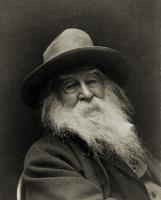

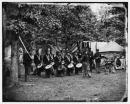
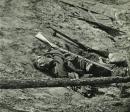
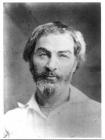

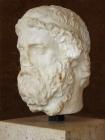
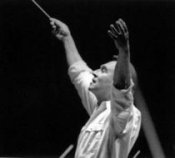
Versi del grande poeta statunitense, composti nel 1863 quando, in seguito al ferimento del fratello George in Virginia nel corso di una delle cruente battaglie della Guerra Civile, Walt Withman divenne per qualche mese infermiere volontario negli ospedali da campo.
Nella raccolta intitolata “Drum-Taps”, poi incorporata in una delle tante edizioni di “Leaves of Grass” (1865).
Musica del compositore statunitense John Coolidge Adams (1949-), nella sua opera per orchestra da camera e baritono composta nel 1988/89.